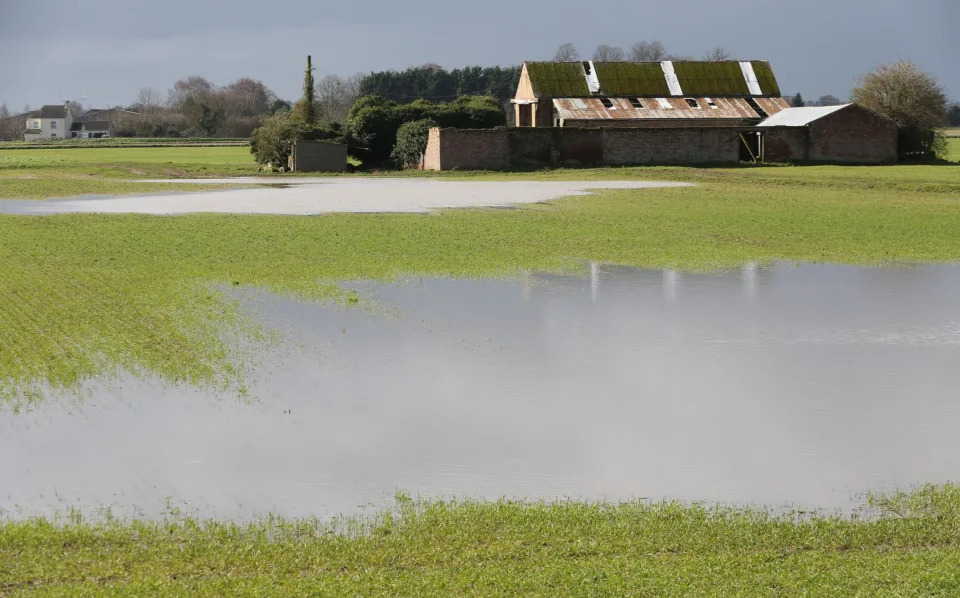Ben Riley-Smith
Tue, 16 April 2024

Nigel Farage said there had been 'no public order threat whatsoever'
Downing Street has said attempts by police in Belgium to shut down a conservative conference featuring Nigel Farage and Suella Braverman on Tuesday were “extremely disturbing”.
Mr Farage was on stage at the National Conservatism Conference in Brussels when officers entered the venue to serve a court order demanding its closure with “immediate effect”.
Legal papers, seen by The Telegraph, suggested speeches at the event could cause public disorder, be homophobic or offend minorities.
The conference organisers had been forced to relocate to the venue on Monday night after a conference hall and a hotel cancelled their bookings following claims of “political pressure” from the local Left-wing mayor.
A No 10 spokesman said: “Clearly, these reports are extremely disturbing. The Prime Minister is a strong supporter and advocator for free speech, and he believes that should be fundamental to any democracy.
“Speaking more broadly to the principle of such events, he is very clear that cancelling events or preventing attendance and no-platforming speakers is damaging to free speech and to democracy as a result. He is very clear that free debate and the exchange of views is vital, even where you disagree.”
Mrs Braverman, the former home secretary, who also spoke at the gathering, criticised what she called the “Brussels thought police” for undermining free speech.
After her speech, she told reporters: “The thought police instructed by the mayor of Brussels are so fit to try and undermine and denigrate what is free speech and free debate.
“I remember the words of Mrs Thatcher, and I’m going to misquote her, but the more ridiculous and far-fetched and extremist their attempts are to silence us, the more cheered on I am. Because it just shows that they’ve lost their political argument.”

Suella Braverman said opponents had 'lost their political argument' - Omar Havana/Getty Images
Miriam Cates, the Tory MP for Penistone and Stocksbridge, had to be smuggled into the venue to deliver her speech on protecting children. She was disguised in a tartan headscarf and taken in through a service entrance.
She said: “It’s just incredible. Many of the speakers are elected politicians in their own countries, and people can disagree with them, but they’re legally elected. It’s just extraordinary that there’s been an attempt to shut them down like this. It’s the opposite of liberalism.”
Writing for The Telegraph, Mr Farage said: “The monstrous reaction in Brussels to this conference comes as no surprise to me. I was personally banned from restaurants, pubs and coffee bars in my last few years in this city.
“But today, the Brussels elite have exhibited their culture on a global stage. In fact, it’s far more serious than that.
“Cancel culture is saying: ‘I do not want to hear your opinion.’ What happened today is an updated form of Soviet communism. It says that no other view is allowed, that anybody that holds it is, by definition, mad, bad, and dangerous. It’s an approach that has, and will always, fail in the end.”
Mr Farage, the honorary president of Reform UK, told the audience that police would have to drag him from the stage if they wanted to silence him.
A police cordon was erected to prevent people from entering the venue, but officers did not go into the conference room to remove speakers or delegates as a court battle ensued.
The event was allowed to continue while organisers mounted a legal challenge against the order to shut it down from Emir Kir, a local Brussels mayor. “This event could undeniably lead to violent reactions [and] considerable disturbances of public order,” the order said.
Mr Kir, the long-serving mayor of the city’s Saint-Josse district, was kicked out of the Socialist Party in Brussels in 2020 after he met politicians from Turkey’s far-Right.
The event had originally been due to be held at the Concert Noble ballroom, but on Friday Yoram Hazony, the conference chairman, said his team had been told by the venue that it had to pull the event amid “political pressure” from Philippe Close, the Socialist Party mayor of Brussels.

Belgian police enter the conference venue on Tuesday - Omar Havana/Getty Images
The Claridge club, owned by Lassaad Ben Yaghlane, a Belgian-Tunisian businessman, stepped in to host it. As he defied orders to shut it down, officials ordered his car to be towed away and catering firms were blocked from delivering supplies.
“These are not the people I normally share the same values with,” Mr Ben Yaghlane said of the conference attendees. “The difference is that I understand they want stability and maintaining [of] traditional values, but we live in a world that evolves a lot at the moment and needs more openness and acceptance for the values of others.”
Mr Ben Yaghlane has owned the venue, which is more used to hosting weddings, bar mitzvahs and parties, since 2013. Mr Farage said: “He is hugely brave.”
Nigel Farage
Nasty Brussels police have just proven Brexit right
Read more
Mr Farage, who delivered a speech on his history of clashing with the ruling class in Brussels, said there was “no public order threat”. Eric Zemmour, the French firebrand, delivered his speech on the pavement outside after he was refused entry by police.
Mr Hazony, the conference chairman, said: “We work very hard to make sure that fringe elements, political extremists don’t catch a ride on our conferences.” A spokesman also insisted the event was “extremely peaceful”.
Frank Furedi, of the MCC Brussels think tank, said the attempt to shut down the event was “an entirely political act ... political decisions are masqueraded as technical ones.”
On Tuesday, organisers were working to secure a new venue for the second day of the conference, when Viktor Orban, the Hungarian prime minister, is due to speak. There were doubts the legal challenge to overturn the court order would succeed in time to hold the event.
In her speech, Mrs Braverman claimed Rishi Sunak lacked the “political will” to take Britain out of the European Convention of Human Rights.
She said the Prime Minister’s promise to prevent “foreign courts” from stopping Britain from sending asylum seekers to Rwanda was “inauthentic”, calling leaving “right and necessary” and also the “politically expedient” option for the Government.






























